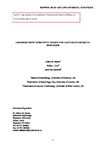A Reinforcement Sensitivity Theory explanation of antisocial behaviour
| dc.contributor.author | Bacon, Alison | |
| dc.contributor.author | Corr, PJ | |
| dc.contributor.author | Satchell, LP | |
| dc.date.accessioned | 2017-11-07T15:14:29Z | |
| dc.date.available | 2017-11-07T15:14:29Z | |
| dc.date.issued | 2018-03-01 | |
| dc.identifier.issn | 0191-8869 | |
| dc.identifier.uri | http://hdl.handle.net/10026.1/10136 | |
| dc.description.abstract |
A comprehensive explanation of antisocial behaviour (ASB) needs to focus on both individual differences in personality and life events as potentially predisposing factors. The current studies investigated the relative influence of both of these in males and females. We used the Reinforcement Sensitivity Theory (RST) of personality to investigate the extent to which dispositional approach and avoidance tendencies relate to ASB. In the first study, 287 participants reported their engagement in ASB and completed the RST Personality Questionnaire (RST-PQ). In the second study, a new sample of 282 participants completed the same measures as well as reporting the extent to which they had experienced life strains. Results from both studies showed a positive association between goal-drive persistence and ASB in males; while in females, a positive association was found between impulsivity and ASB. In Study 2, life strains explained further variance in ASB and this also show a gender differentiation: in males, there was a stronger relationship between financial strains and ASB while females showed an association between relational strains and ASB. Overall, results suggested that ASB is more pronounced in the male sample with an instrumental purpose while in the female sample personal life events are of more relevance. | |
| dc.format.extent | 87-93 | |
| dc.language | en | |
| dc.language.iso | en | |
| dc.publisher | Elsevier | |
| dc.subject | Reinforcement sensitivity theory | |
| dc.subject | Antisocial behaviour | |
| dc.subject | Strain | |
| dc.subject | Sex-differences | |
| dc.title | A Reinforcement Sensitivity Theory explanation of antisocial behaviour | |
| dc.type | journal-article | |
| dc.type | Journal Article | |
| plymouth.author-url | https://www.webofscience.com/api/gateway?GWVersion=2&SrcApp=PARTNER_APP&SrcAuth=LinksAMR&KeyUT=WOS:000424069200014&DestLinkType=FullRecord&DestApp=ALL_WOS&UsrCustomerID=11bb513d99f797142bcfeffcc58ea008 | |
| plymouth.volume | 123 | |
| plymouth.publication-status | Published | |
| plymouth.journal | Personality and Individual Differences | |
| dc.identifier.doi | 10.1016/j.paid.2017.11.008 | |
| plymouth.organisational-group | /Plymouth | |
| plymouth.organisational-group | /Plymouth/Faculty of Health | |
| plymouth.organisational-group | /Plymouth/Faculty of Health/School of Psychology | |
| plymouth.organisational-group | /Plymouth/REF 2021 Researchers by UoA | |
| plymouth.organisational-group | /Plymouth/REF 2021 Researchers by UoA/UoA04 Psychology, Psychiatry and Neuroscience | |
| plymouth.organisational-group | /Plymouth/REF 2021 Researchers by UoA/UoA04 Psychology, Psychiatry and Neuroscience/UoA04 REF peer reviewers | |
| plymouth.organisational-group | /Plymouth/Research Groups | |
| plymouth.organisational-group | /Plymouth/Research Groups/Centre for Brain, Cognition and Behaviour (CBCB) | |
| plymouth.organisational-group | /Plymouth/Research Groups/Centre for Brain, Cognition and Behaviour (CBCB)/Behaviour | |
| plymouth.organisational-group | /Plymouth/Research Groups/Plymouth Institute of Health and Care Research (PIHR) | |
| plymouth.organisational-group | /Plymouth/Users by role | |
| plymouth.organisational-group | /Plymouth/Users by role/Academics | |
| dcterms.dateAccepted | 2017-11-07 | |
| dc.rights.embargodate | 2019-11-13 | |
| dc.rights.embargoperiod | Not known | |
| rioxxterms.versionofrecord | 10.1016/j.paid.2017.11.008 | |
| rioxxterms.licenseref.uri | http://www.rioxx.net/licenses/all-rights-reserved | |
| rioxxterms.licenseref.startdate | 2018-03-01 | |
| rioxxterms.type | Journal Article/Review |


